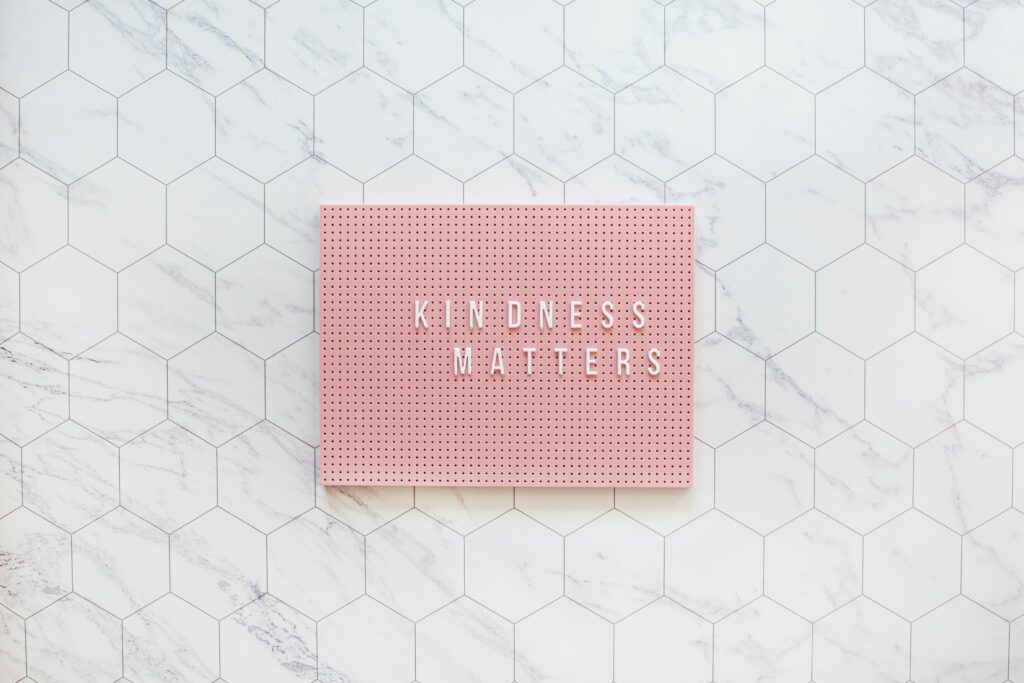Work today is often focused on productivity: Do your job well and efficiently! Be a top performer! Help the business to compete! But that’s an attitude that focuses more on the head more than the heart. This article discusses the value of kindness at work.
There’s science behind the idea, coined by Dacher Keltner, of “survival of the kindest.” Social scientists like Keltner identify three main instincts that have powered our survival:
- Caution, or “avoiding life’s ‘sticks’”
- Seeking out new opportunities, or “life’s ‘carrots’”
- Appreciating a sense of contentment
As executive and leadership coach Karen Liebenguth writes in an HRZone article, when we experience that contentment or calm is when “we are confident enough to look outwards beyond the immediate needs of survival and are able to live a more connected and harmonious way with those around us.”
That connection encourages cooperation, and it is by working together that we succeed. Hence, “survival of the kindest.” And it’s not just survival of one individual, it’s survival of the entire species. That ties into employees working together to see their company succeed.
Teams that work in a respectful, kind environment are more energetic (26% more, in fact), more enthusiastic about learning new skills and being exposed to new ideas (30% more), and more satisfied and committed at work, according to research cited by WorkHuman.
Spillover effect of kindness
The good thing is that acts of kindness reverberate. “Spillover effects can multiply fast,” say a trio of authors writing in the Harvard Business Review (HBR).
Decades of studies have identified the benefits of positive work culture. Practicing kindness, the HBR article summarizes:
- Reduces employee burnout and absenteeism
- Increases employee well-being
- Boosts individual self-esteem
- Improves self-evaluations
- Triggers positive emotions that confirm our self worth
- Benefits long-term job satisfaction
How does kindness facilitate all that? Because thinking about other people long enough to act kindly towards them fosters connection. That’s the social glue that gives a business a competitive advantage.
Kindness & connection
Kindness is the foundation of connection. When we show and experience kindness, we’re more likely to have positive interactions with our colleagues, clients, or customers. This can lower psychological stress, boost employee health, encourage creativity, and increase risk-taking.
Connection also “gives purpose and meaning to our lives,” says researcher and author Brene Brown in a TED Talk on vulnerability,
A lot has been written about the importance of employees feeling a sense of purpose. Finding meaning in work supports engagement, motivation, and retention.
Part of connection is demonstrating compassion. Research suggests that promoting an ethic of compassion rather than a culture of stress leads to a happier workplace and an improved bottom line.
Being kind involves individuals in something bigger than themselves. This can help colleagues find common ground, build relationships they value, and resist bullying or poor treatment of their peers.
Kindness creates leaders
Stanford psychologist Jamil Zaki suggests that kindness also creates leaders. That’s because leadership is about “taking care of the people in your charge.” A kind leader will value relationships, treat everyone with respect, encourage teams, and challenge them to grow.
This can be the antithesis of the contemporary image of successful leadership. Instead of driving people to do better with criticism and shame, the kind leader talks about wellbeing and authenticity. And that goes a long way. In a study comparing workplaces that showed generosity to one another and those that did not, the acts of kindness “had a huge impact on the overall positivity in the workplace, and on the employees’ sense of wellbeing.” According to Dr. Pragya Agarwal, in a Forbes article, “The people who received kindness through the 4 weeks reported a sense of camaraderie. In addition, the receivers felt in control at work and reported significantly higher levels of happiness.”
The acts of kindness didn’t even have to be major. A small and insignificant kindness serves as a buffer during stress for the control group and helped them through difficult work conditions. The individuals who had received kindness were also more autonomous and felt more competent at work. This also empowered them to be more creative and willing to think outside of the box. They were also more likely to look after each other more (there’s that spillover effect again).
What are some acts of kindness in the workplace?
Kindness at work can be seen in many ways. From small things like smiling, to mentoring new employees and taking an active role in their growth. All acts, big and small, contribute to creating a productive and collaborative workplace. So, here are just some of the many ways in which you can show kindness at work:
- Helping coworkers
- Recognizing efforts and appreciating others
- Having meaningful conversations
- Listening to others
- Organizing team activities
- Being mindful of your words and tone
The importance of kindness at work
Kindness at work can help people feel confident, creative, supported, and happy. This all helps to increase productivity, improve employee wellbeing, and boost employee engagement. Now the question is, how do you inject kindness into your work day? Look for a future article in this series sharing several tips for committing acts of kindness at work that will benefit you and your business.
Want to know how your employees feel about your work culture? Sogolytics can help you take a pulse of your people. Or you can work directly with our consultants to set up an employee experience platform that best suits your needs.








